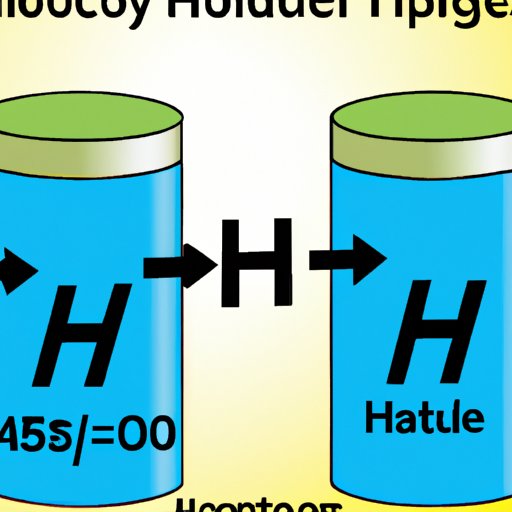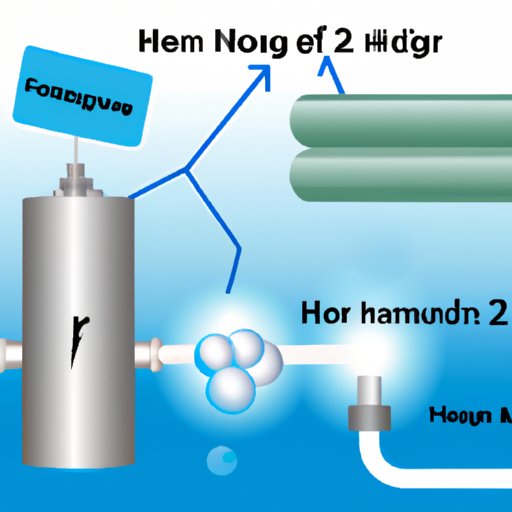Introduction
Hydrogen fuel cells are a type of power generation technology that uses hydrogen as a source of energy. The term “fuel cell” refers to a device that converts chemical energy into electrical energy through an electrochemical reaction. Hydrogen fuel cells have been used in various applications, ranging from powering electric vehicles to powering homes and businesses.
Hydrogen fuel cells offer several advantages over traditional sources of energy. They are more efficient than combustion engines and produce no emissions, making them a cleaner, greener alternative. Additionally, they can be used to produce electricity on-site, eliminating the need for a large power grid.

Exploring the Science Behind Hydrogen Fuel Cells
The chemistry of hydrogen fuel cells involves two key elements: hydrogen and oxygen. When these two elements are mixed together, an electrochemical reaction occurs, releasing electrons which can then be used to generate electricity. The energy created by this reaction is known as “free energy”, meaning it does not require any additional input from outside sources.
The main benefit of using hydrogen fuel cells is that they are highly efficient. In comparison to combustion engines, they are able to extract more energy from the same amount of fuel. Additionally, they produce no emissions, making them a much cleaner and more sustainable form of energy production.
A Comprehensive Guide to Hydrogen Fuel Cell Technology
There are several different types of hydrogen fuel cells available, each of which has its own unique set of features and benefits. For example, proton exchange membrane fuel cells (PEMFCs) are often used in vehicles and other mobile applications due to their high energy density and low operating temperatures. Alkaline fuel cells (AFCs) are typically used in stationary applications, such as powering homes or businesses.
Regardless of the type of fuel cell, all hydrogen fuel cells contain four basic components: a fuel source, an electrolyte, a catalyst, and an electrode. The fuel source is typically either pure hydrogen gas or a hydrogen-rich compound, such as methanol or ethanol. The electrolyte is a liquid or gel that conducts electrical current between the fuel source and the electrodes. The catalyst helps to speed up the electrochemical reaction, while the electrodes collect the electrical current produced by the reaction.

Examining the Benefits of Hydrogen Fuel Cells
Hydrogen fuel cells offer several advantages over other forms of power generation. One of the most significant benefits is their environmental impact. Hydrogen fuel cells produce no emissions, making them a much cleaner source of energy than traditional combustion engines. Additionally, they are much more efficient than combustion engines, meaning less fuel is needed to produce the same amount of energy.
Hydrogen fuel cells can also help reduce energy costs for businesses and homeowners. By using hydrogen fuel cells to generate electricity on-site, the need for a large power grid is eliminated, resulting in significant cost savings. Finally, hydrogen fuel cells are relatively easy to maintain and operate, making them a convenient and reliable source of energy.
A Step-by-Step Guide to How Hydrogen Fuel Cells Work
Hydrogen fuel cells are fairly simple devices that convert chemical energy into electrical energy. The process begins with the introduction of hydrogen gas into the fuel cell. This hydrogen reacts with the oxygen in the air to produce an electrochemical reaction, which releases electrons. These electrons are collected by the electrodes, creating an electrical current that can be used to power appliances and other devices.
When using hydrogen fuel cells, it is important to take safety precautions. The hydrogen gas used in fuel cells is highly flammable and can pose a serious risk of explosion if not handled properly. Therefore, it is essential to follow all safety guidelines when working with hydrogen fuel cells.

Understanding the Chemistry of Hydrogen Fuel Cells
The chemical reactions involved in producing electricity from hydrogen fuel cells are quite complex. At the heart of the process is the catalytic oxidation of hydrogen gas. In this reaction, the hydrogen gas combines with oxygen in the air to produce water and heat. The heat generated by this reaction is then used to drive the electrochemical reaction, which produces the electricity.
In addition to the catalytic oxidation of hydrogen, there are several other chemical reactions involved in the process. These include the formation of hydrogen ions, the transfer of electrons, and the production of protons. Each of these reactions plays an important role in the overall process of generating electricity from hydrogen fuel cells.
Conclusion
Hydrogen fuel cells offer a clean, efficient, and cost-effective way to generate electricity. They produce no emissions and offer significant environmental benefits compared to traditional sources of energy. Additionally, they are relatively easy to maintain and operate, making them a convenient and reliable source of power.
Understanding how hydrogen fuel cells work is essential for anyone interested in using this technology. By examining the chemistry of hydrogen fuel cells and exploring the process of generating power from them, we can gain a better understanding of the potential benefits of hydrogen fuel cells.
As the world continues to look for new and innovative ways to generate energy, hydrogen fuel cells will likely play an increasingly important role. By taking the time to understand how hydrogen fuel cells work, we can make informed decisions about our energy future.
(Note: Is this article not meeting your expectations? Do you have knowledge or insights to share? Unlock new opportunities and expand your reach by joining our authors team. Click Registration to join us and share your expertise with our readers.)
